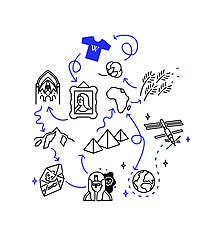The wiki rabbit hole (or wiki black hole)[1] is the learning pathway which a reader travels by navigating from topic to topic while browsing Wikipedia (through hyperlinks in articles) and other wikis. The metaphor of a rabbit hole comes from Lewis Carroll's 1865 novel Alice's Adventures in Wonderland, in which Alice begins an adventure by following the White Rabbit into his burrow. The black hole metaphor comes from the idea that the reader is powerfully sucked into a hole from which they cannot escape.

After learning or studying outside of Wikipedia, many people go to the online encyclopedia to learn more about the same topic, and then proceed to topics progressively further removed from where they started.[2] Films based on historical people or events often spur viewers to explore Wikipedia rabbit holes.[3]
Data visualizations showing the relationships between Wikipedia articles demonstrate pathways that readers can take to navigate from topic to topic.[4] The Wikimedia Foundation publishes research on how readers enter rabbit holes.[5] Rabbit hole browsing behavior happens in various languages of Wikipedias.[6]
Wikipedia users have shared their rabbit hole experiences as part of Wikipedia celebrations as well as on social media.[7][8] Some people go to Wikipedia for the fun of seeking a rabbit hole.[9][10] Exploring the rabbit hole can be part of wikiracing.[11]
In 2024, SmartLess Media debuted WikiHole, a podcast hosted by D'Arcy Carden and featuring "a panel of comedians who fall down a Wikipedia rabbit hole of bizarre and intriguing connections".[12]
References
edit- ^ Stockton, Chrissy (January 4, 2014). "The 10 Best Wikipedia Black Holes For Curious People (Who Have No Impulse Control)". Thought Catalog.
- ^ Yahr, Emily (January 4, 2018). "Do you fall down a Wikipedia rabbit hole after each episode of 'The Crown'? You're not alone". Washington Post.
- ^ Beck, Lia (August 23, 2018). "13 Movies Based On True Stories With Wikipedia Rabbit Holes You'll Spend Hours On". Bustle.
- ^ Li, Shirley (December 12, 2014). "WikiGalaxy: A Visualization of Wikipedia Rabbit Holes". The Atlantic.
- ^ Allemandou, Joseph; Popov, Mikhail; Taraborelli, Dario (January 16, 2018). "New monthly dataset shows where people fall into Wikipedia rabbit holes – Wikimedia Blog". Diff, a Wikimedia community blog.
- ^ Wang, Shan (March 16, 2018). "Why do people go to Wikipedia? A survey suggests it's their desire to go down that random rabbithole". Nieman Lab. Nieman Foundation for Journalism.
- ^ "On Wikipedia's 15th birthday, Ars shares the entries that most fascinate us". Ars Technica. January 16, 2016.
- ^ Howard, Dorothy (July 22, 2015). "Feed my Feed: Radical publishing in Facebook Groups". Rhizome. Retrieved January 31, 2019.
- ^ Bosch, Torie (January 25, 2018). "Rabbit Holes: Exploring the Wikipedia Page of "People Who Disappeared Mysteriously."". Slate Magazine.
- ^ "10 Outrageous Wikipedia Articles That Will Send You Down a Rabbit Hole". Thrillist. April 30, 2020.
- ^ "Down the Wikipedia Rabbit Hole: The Game! - On The Media - WNYC Studios". WNYC Studios. February 5, 2015.
- ^ White, Peter (January 24, 2024). "D'Arcy Carden To Host 'WikiHole' Podcast For SmartLess Media". Deadline. Retrieved February 27, 2024.
External links
edit- The Problem with Wikipedia, an xkcd comic on the wiki rabbit hole
- Wiki Wormhole, Wikipedia article review series from The A.V. Club
- WikiNav, a tool that shows the most popular incoming and outgoing links in a Wikipedia article